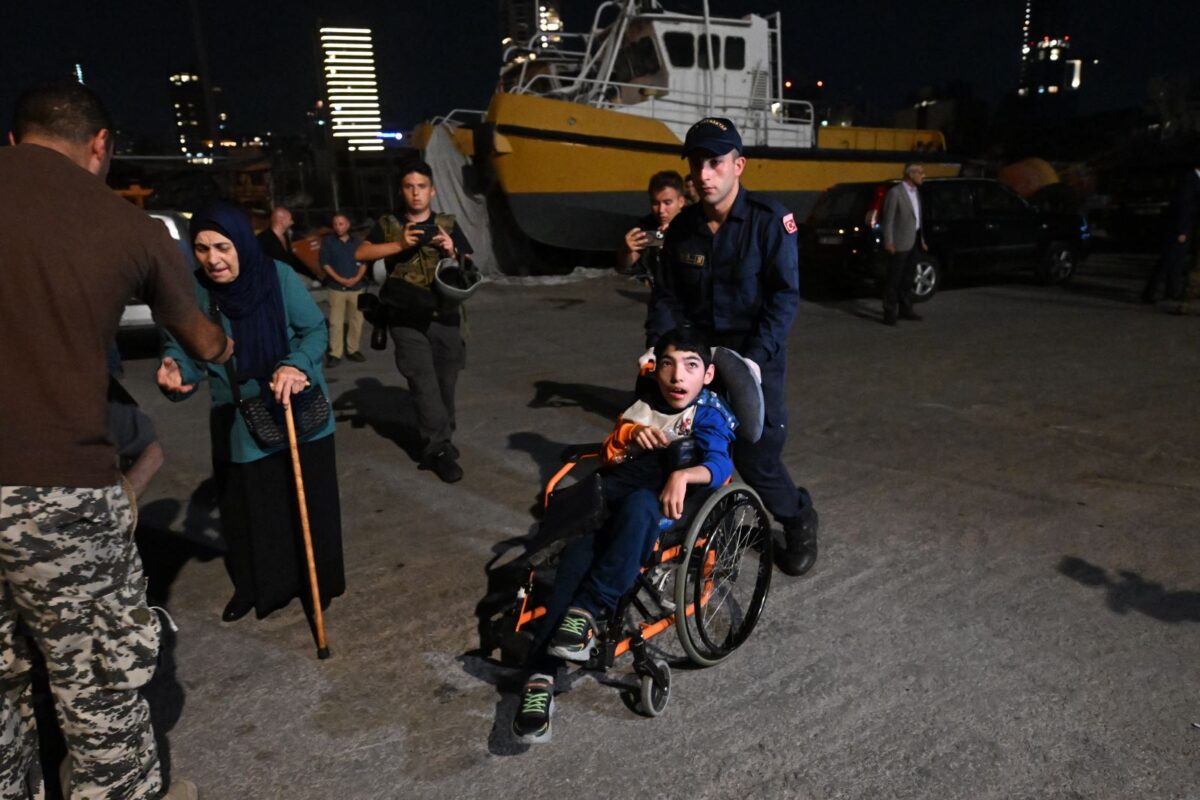
The war has exacerbated the suffering of people with disabilities in Lebanon. As the situation worsened, hundreds of thousands from southern Lebanon, the Beqaa, and parts of Beirut were forced to flee their homes, including individuals with disabilities. Many had to leave behind their belongings and essential assistive devices such as wheelchairs, hearing aids, oxygen tanks, and other critical supplies. Most have sought refuge in shelters ill-equipped to accommodate displaced individuals, while some were left to sleep on the streets.
Joumana Daou, an expert in inclusive policies and an activist for human rights in Lebanon who works with different local charities, emphasizes that displacement has been a “shock to all Lebanese, whether they have disabilities or not, due to the absence of a clear emergency plan and adequate preparations to assist a large number of displaced people.”
She highlights that some spent up to 21 hours on the road to reach shelters, many of which are not equipped to accommodate individuals with disabilities, even under normal circumstances, let alone during war.
Thousands have been killed since the war began with over 10,000 people have been injured, along with thousands of individuals impacted by the pager attack that took place in September and left thousands with a loss of their sight or limbs. These injuries have led to severe physical and psychological consequences.
Activists like Joumana call for urgent coordination between the state and specialized organizations to address the needs of displaced individuals with disabilities.
This includes providing essential items like mattresses, hearing aids, wheelchairs, and chronic medications, such as those required by multiple sclerosis patients, which can be life-threatening if missed. Joumana stresses the need for these immediate measures to pave the way for a comprehensive national plan.
In Lebanon, individuals with disabilities represent approximately 13 per cent of the population, yet only 7 per cent have access to protection services. Displacement exacerbates their challenges, as many face multiple protection risks throughout the displacement cycle. They are often more vulnerable to discrimination and exclusion from essential services.
Trauma after trauma
People with disabilities face heightened psychological distress due to displacement, beginning with the stress, anxiety, and trauma caused by raids and shelling. This is compounded by enduring long hours in queues to reach safety and ultimately arriving at shelters that are not adequately equipped to meet their needs.
Dr. Luna Hammad, MSF medical coordinator in Lebanon says the needs are huge. “People who have been displaced are very vulnerable – children, women, elders, and people with physical disabilities living in terrible conditions including limited access to clean water, sanitation, and basic healthcare services.”
Most displaced people urgently need assistance, having fled without basic necessities, while the communities and shelters hosting them are also in dire need of support.
Jehan a mother of 3 from Kfarkela was displaced to Mount Lebanon and is sheltering in a school. She spoke to NOW on the condition of keeping her full name anonymous and the school name unmentioned.
“I am heartbroken for my 13-year-old disabled son, Ali, who needs full-time assistance as he is in a wheelchair and suffers from speech difficulty and delayed mental development. I am grateful for being alive but we are honestly living in misery every day as we feel humiliated by the whole situation of displacement,” she said.
“Now we have a home that has been turned into rubble, I cannot imagine how hard it will be for me and my family to rebuild from scratch again, my husband worked as a taxi driver and I worked in making Mouneh from home, we cannot afford all this burden from the Israeli damage on our lives and our children,” Jehan added.
Her home in Kfarkela was ideal for her son’s needs; he could easily navigate between rooms in his wheelchair, access the balcony, and enjoy the garden, all in the familiar comfort of their village home. Now, Jehan sees him feeling trapped. In the overcrowded shelter, he’s reluctant to move around, accessing the toilet is difficult, and going outside is a challenge due to the stairs being the only way out.
Many individuals like Jehan’s son, Ali, are experiencing the harsh realities of war and displacement, with their already difficult lives becoming even harder. This disabled community, largely marginalized in Lebanese society, was already grappling with numerous challenges before the war.
According to Nada Al-Azir, a project manager at the Lebanese Union for Physically Disabled People, “there are many individuals with disabilities who have been displaced to the homes of their relatives, but they have not yet received any assistance or medical aid,” indicating that “the needs are huge, including medical aid that facilitates their movement, water mattresses, air mattresses, and medical beds, since they cannot sit.”
Nada spoke about the efforts made by the emergency team to communicate with people with disabilities who were displaced to homes to find out their needs.
Basic needs were assessed and addressed through coordination with area coordinators appointed by the Ministry of Social Affairs in Lebanon. However, for Nada, the issue remains the overcrowding of shelters. With the ceasefire agreement now in place, thousands are expected to return to their villages, leading to an exodus from the schools-turned shelters.
“A huge number of people with disabilities were referred to two equipped shelters, but their capacity is limited and they are no longer able to receive anyone. This is one of the most prominent challenges we faced,” Nada said.
Rodayna Raydan is a Lebanese-British journalist. You can follow her on Twitter @Rodayna_462
The views in this story reflect those of the author alone and do not necessarily reflect the beliefs of NOW.








